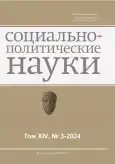Electronic digital virtualization in criminology: objects and forms of research; criminalistic significance for the criminal process
- Authors: Lozinsky O.I.1
-
Affiliations:
- South Russian Institute of Management – branch of the Russian Presidential Academy of National Economy of Public Administration
- Issue: Vol 14, No 3 (2024)
- Pages: 108-114
- Section: New issues in law
- URL: https://journals.eco-vector.com/2223-0092/article/view/635477
- DOI: https://doi.org/10.33693/2223-0092-2024-14-3-108-114
- EDN: https://elibrary.ru/JJMZFG
- ID: 635477
Cite item
Abstract
The purpose of the study. The article analyzes the manifestations of electronic digital virtualization in criminology, which is reflected both in the expansion of the range of objects of its research, and in the emergence of new types and forms (methodological, hardware-man-made) research in this field. The results of forensic practice make it possible to counteract the criminalization of the electronic digital virtual sphere and become potentially and actually, after their appropriate regulatory and legal formalization, a source of new objective evidence in the fight against criminal manifestations in the electronic digital information and communication environment.
Conclusions. Domestic criminology, in the process of a dynamic transition of society from the industrial stage of development to the information one, acquires innovative areas and objects of research, including and in a virtual environment, which is accompanied by the generation and implementation of types and forms of research with virtualization elements. The results of forensic research in a virtual environment should be guaranteed to be able to become a source of objective evidence in the domestic criminal process, which requires the dynamic development of the legislative framework in this area, which at present is very much limited only to the field of computer-technical expertise.
Full Text
About the authors
Oleg I. Lozinsky
South Russian Institute of Management – branch of the Russian Presidential Academy of National Economy of Public Administration
Author for correspondence.
Email: oleg.lozz@yandex.ru
SPIN-code: 3389-3371
Cand. Sci. (Law); associate professor, Department of Procedural Law
Russian Federation, Rostov-on-DonReferences
- Alekhin P.M. Criminalistic computer modeling in criminal proceedings. Law and Legality: Questions of Theory and Practice. 2023. No. 4. Pp. 89–94. (In Rus.)
- Bobrov V.A. The use of virtualization tools in matters of crime investigation. Bulletin of the Academy of Law and Management. 2022. No. 7. Pp. 71–76. (In Rus.)
- Bargishev K.E. Problematic issues of disclosure and investigation of illegal acts committed using neural network technologies. Bulletin of St. Petersburg University. 2024. No. 1. Pp. 131–137. (In Rus.)
- Buksman E.R. Forensic rendering: Basic concepts and provisions. Scientific Review. International Scientific and Practical Journal. 2023. No. 3. Pp. 147–153. (In Rus.)
- Voskresova S.Yu. Using the possibilities of virtual reality for forensic purposes: On the example of recreating crime scenes. My Professional Career. 2023. No. 2. Pp. 56–62. (In Rus.)
- Verkhovtsev A.Yu. Computer modeling in the investigation of crimes in the field of electronic digital information and communication technologies. Notes of a Scientist. 2023. No. 6. Pp. 119–123. (In Rus.)
- Gomelsky V.A. Artificial intelligence in the criminalistic sphere. Bulletin of the State Law Institute. 2023. No. 4. Pp. 94–99. (In Rus.)
- Derevyanko M.L. Virtualization tools as an object of digital criminalistics research. Bulletin of Tomsk State University. 2024. No. 1. Pp. 131–134. (In Rus.)
- Zelmin M.Yu. Neural network technologies in the field of forensic research. Bulletin of the Nizhny Novgorod Academy of the Ministry of Internal Affairs of Russia. 2022. No. 6. Pp. 74–79. (In Rus.)
- Idrisov M.B. Criminalistic response to the use of virtualization tools in the criminal sphere. Higher School: Scientific Research. 2023. No. 2. Pp. 83–87. (In Rus.)
- Istomina V.N. Computer modeling in the investigation of crimes against public safety. Law Enforcement Agencies: Theory and Practice. 2022. No. 6. Pp. 147–151. (In Rus.)
- Lukmanov I.A. Means and objects of virtualization as a source of potential evidence in the investigation of crimes. Eurasian Law Journal. 2023. No. 2. Pp. 106–110. (In Rus.)
Supplementary files








